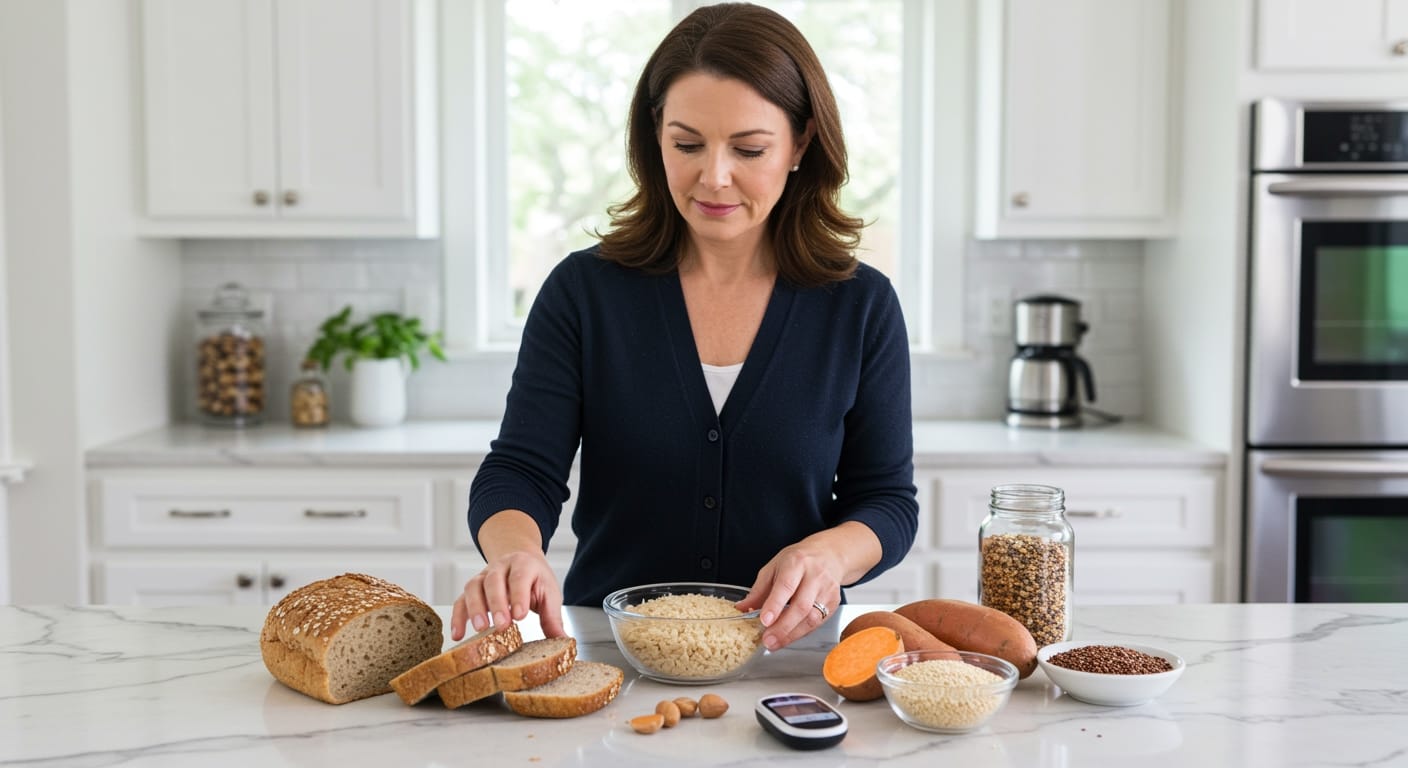✪ Key Takeaway: Eating carbs last during meals can improve blood sugar control by up to 40% compared to eating them first.
Introduction
Your doctor tells you to count carbs, but nobody talks about when to eat them.
You might be wondering if the timing of your carb intake actually matters for your blood sugar control, or if it is just another complicated rule to follow.
Hi, I am Abdur, your nutrition coach, and today I am going to explain how carb timing can dramatically change your diabetes management and help you achieve better blood sugar stability.
Does the Order of Food Matter for Blood Sugar?
The sequence of foods you eat during a meal creates a massive difference in your blood sugar response.
Research shows that eating carbohydrates last can reduce post-meal blood sugar spikes by 28-37% compared to eating them first.
When you eat protein and vegetables before carbs, these foods create a protective barrier in your stomach.
This barrier slows down carbohydrate absorption and prevents rapid glucose spikes that damage your blood vessels over time.
The fiber from vegetables and protein from meat or fish triggers hormones that improve your body’s insulin sensitivity.
Your pancreas does not have to work as hard to produce insulin when carbs arrive later in the meal.
✪ Pro Tip: Start every meal with a small salad or handful of nuts to prime your digestive system.
What Time of Day Should You Eat Carbs?
Your body handles carbs differently throughout the day based on your circadian rhythm.
Morning hours offer the best insulin sensitivity, making breakfast and lunch ideal times for higher carb intake.
Your muscles are most receptive to glucose uptake between 6 AM and 2 PM when cortisol levels naturally peak.
Evening carb consumption leads to higher blood sugar levels because your metabolism slows down as bedtime approaches.
Studies show that eating the same carb portion at dinner versus breakfast can result in 20% higher glucose levels.
If you must eat carbs at dinner, choose complex carbs like quinoa or sweet potato over simple sugars.
Your body needs at least 3 hours to process carbs before sleep to avoid overnight blood sugar fluctuations.
✪ Fun Fact: Your insulin sensitivity drops by 50% between morning and evening hours.
Should You Eat Carbs Before or After Exercise?
Exercise timing with carb intake creates powerful effects on your blood sugar management.
Eating carbs after exercise allows your muscles to absorb glucose without requiring much insulin.
Your muscle cells become glucose sponges for up to 2 hours after moderate physical activity.
Pre-exercise carbs can cause blood sugar spikes that make you feel sluggish and interfere with fat burning.
A 15-minute walk after eating carbs can reduce blood sugar spikes by 30% compared to sitting still.
Even light movement like washing dishes or folding laundry helps your muscles use glucose more efficiently.
The optimal window for carb consumption is within 30 minutes after finishing your workout.
✪ Note: Even 10 minutes of walking after meals can significantly improve glucose control.
How Long Should You Wait Between Carb Portions?
Spacing your carb intake throughout the day prevents overwhelming your insulin system.
Your body needs at least 3-4 hours between significant carb portions to return blood sugar to baseline.
Eating carbs every 2 hours keeps your blood sugar on a constant roller coaster that exhausts your pancreas.
The three-meal approach with proper spacing allows your insulin sensitivity to reset between meals.
Snacking on carbs between meals can double your daily insulin requirements compared to eating them only at main meals.
If you need snacks, choose protein and fat combinations that do not trigger significant insulin responses.
✪ Pro Tip: Set meal alarms to maintain consistent 4-hour spacing between carb-containing meals.
Can Meal Timing Replace Diabetes Medication?
Strategic meal timing can dramatically improve your diabetes control, but it works best alongside medical treatment.
Many people reduce their medication needs by 30-50% when they master carb timing techniques.
Your doctor can adjust your medication dosages as your blood sugar control improves through better timing.
Some people with type 2 diabetes achieve normal blood sugar levels using only lifestyle interventions including meal timing.
However, people with type 1 diabetes will always need insulin, though timing strategies can reduce the required amounts.
Never stop or change medications without consulting your healthcare provider, even if your blood sugars improve significantly.
The combination of proper timing and appropriate medication creates the most stable control possible.
✪ Note: Always work with your healthcare team when making significant dietary changes.
The Bottom Line
Carb timing matters tremendously for diabetes management, and the research proves that when you eat carbs can be just as important as how much you eat.
As I always tell my clients, your body is not a calculator that only counts carbs – it is a complex system that responds to timing, sequence, and context.
I would love to hear about your experiences with meal timing and any questions you have about implementing these strategies in your daily routine, so please share your thoughts in the comments below.
References
At NutritionCrown, we use quality and credible sources to ensure our content is accurate and trustworthy. Below are the sources referenced in creating this article:





